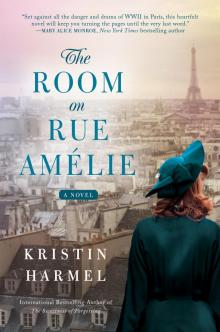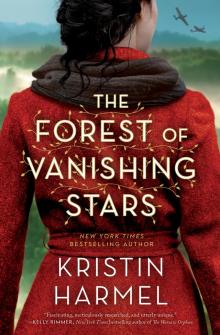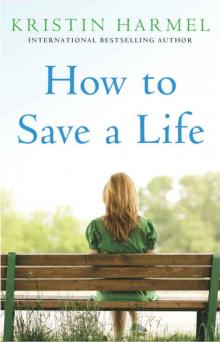- Home
- Kristin Harmel
The Forest of Vanishing Stars Page 10
The Forest of Vanishing Stars Read online
Page 10
Yona reached out and touched his arm. “I’m sorry about your parents, Aleksander. And your brothers. There aren’t words enough to express that.”
He turned to her, holding her gaze for a long time. “Thank you. But the farmer was right. I have to keep living. I have to go on. Or every trace of us, of the Gorodinsky family, of what we were, of what we could have been, will be gone. The Germans, they don’t just wipe out our people. They wipe out our future. And I can’t bear that.”
Yona nodded. If there were words to say after that, she did not know them. It was the most she had ever spoken with another person, the most she had learned about the personal toll of what the Germans were doing, and her throat felt thick with grief. So she touched his arm again, so that he could hear the things she wasn’t saying and understand that she was with him.
By the time they had constructed three makeshift shelters of bark and leaves, and Leon and Moshe had gathered kindling to make a fire, half of the group was already asleep, including all three children and their mother. Aleksander offered to take a turn keeping watch, and Yona sat beside the fire in the deep darkness of the wood, watching as Sulia and Miriam boiled water and pulled potatoes from one of the rucksacks. She’d never felt so hollowed out, nor so full of emotion, and she wondered how it was possible to feel both at the same time.
CHAPTER TEN
The night was clear and balmy, so the group didn’t bother to build more than basic shelters before filling their bellies with watery soup and crawling off to bed. Leib took the first watch, followed by Aleksander, and when Yona rose in the morning, the sky just beginning to glisten at the edges, she lay still for a moment, watching him move in slow, steady loops around the perimeter of the camp.
He walked quietly—not as quietly as she did after spending a lifetime in the trees, but softly enough that she understood he was a fast study. By his own admission, the forest had never been his home, but he was quickly learning its mysterious ways. The thought filled Yona with a strange blend of relief and sadness—relief because it meant she could teach him enough to help his group survive the winter, sadness because it meant they wouldn’t always need her. She had been with them for less than a day, and already she felt an unexpected attachment to all of them.
She had been right to insist they move—the longer they stayed in place during the summer, the more dangerous their situation became—but Yona also had to admit to herself that the group had fared well on their own. They had figured out a way to gather food, to tell basic poisons from basic sustenance, to build rudimentary shelter, even to arm themselves. It spoke volumes about Aleksander, Rosalia, Leib, and the others that they’d had a sense of what they needed to take from the villages and what they had to do to stay alive. Yona would help to make the upcoming winter easier, but even without her, it was possible they could all survive if they were fortunate enough to stay out of the path of those hunting them.
As Yona stood, she shivered, though the summer day was already warm. Hunting. The word lodged in her chest and throbbed there dangerously. She had hunted animals. She had been hunted by animals. But the thought of humans hunting humans—it was difficult for her to understand, and it made her feel ill.
She headed toward Aleksander, who turned and spotted her as she approached. “You should go back to sleep,” he said. “Get some rest.”
“I don’t sleep much.” It was true. Jerusza had taught her long ago that sleep, though necessary, was equivalent to weakness. Slumber left one vulnerable, useless. With the exception of her final few months, as she slowly passed from this world to the next, Jerusza had never slept more than four hours at a time, and she had often pursed her lips and chided Yona for sleeping for any period longer than that. Last night, though exhausted from the unfamiliar strain of human contact, Yona’s brain had raced with thoughts about all the things she wanted to do in the coming days. She would need to teach the group to preserve fish, to dry bilberries and cawberries for winter, to gather and store mountain ash berries and tree cranberries. She had to teach them how to hunt without weapons, which wild animals would provide the most nutrition, which frogs and snakes could be eaten, which herbs could be picked to help make food more palatable, which could be gathered to help treat ailments. She would need to show them how to build winter shelters and to catch fish when ice had crusted the ponds. They were the secrets of the forest that villagers couldn’t know, secrets that would mean the difference between life and death.
“You look troubled,” Aleksander said after a moment.
She was, of course. She felt responsible for everyone here. But then she looked back at the camp—where Ruth lay clutching all three of her sleeping children, where Oscher and Bina held each other, where Miriam slept with one arm slung protectively over a snoring Leib—and a great peace settled over her, all the questions and worries fading to a whisper. “It will be all right,” she said, as much to herself as to Aleksander.
“I’m very glad you are here, Yona. That we found each other.”
She turned to him. The way he was watching her made her breath catch. “You were already doing a good job, long before I arrived. Everyone is alive and well-fed.”
He smiled slightly. “I wasn’t talking about survival, Yona. I’m grateful for you.” His eyes held hers for a second more before he dropped his gaze. “For your company, I mean.”
Her cheeks warmed, and as she looked back toward the group, she had the feeling that there was deeper meaning in his words. “And I am glad for yours, Aleksander.”
The sky was light a half hour later, and the camp began to stir, the baby crying first. As Ruth pulled him to her breast, she jostled the girls, who both awoke muttering remnants of their dreams. Rosalia was awake next, then Oscher and Bina. Yona watched in silence as they all yawned and stretched, standing and wandering to the edge of the clearing, some of them taking swigs from the canteens they had filled last night, others taking turns relieving themselves in the privacy of the shadows beyond the perimeter.
By the time the sun had crested the trees, Rosalia was on guard, Aleksander had taken Moshe and Leon with him to show them how to use the gill net in the stream they’d passed the night before, the girls were cheerfully gathering berries with their mother, and Yona was teaching Sulia, Miriam, and Luba how to gather the pink Saponaria flowers that bloomed in the summer on hillsides, and how to crush the roots with small stones and mix in a bit of water to make a basic soap.
“Shouldn’t we be doing something more useful?” Sulia asked, loudly enough for her voice to carry to the others, as she bent beside Yona to yank a handful of blooms from the earth. “This feels unnecessary.”
Miriam and Luba glanced at her, but they didn’t say anything. Yona could feel her chest constricting the way it sometimes did when she knew a predator had picked up her scent. “Without soap, you will have disease and lice,” Yona replied. “We’re fortunate that it is summer now, but by autumn, these plants will wilt. Before then, I’ll teach you to make soap from hardwood ash and animal fat.”
Sulia made a small noise in the back of her throat, but she didn’t say anything else.
“Leib said you are very good at catching fish, Yona,” Miriam said after a while. She had moved beside Yona, her skirt lifted in the front to create a basket for the hundreds of flowers she had gathered. She was quiet, and a hard worker, which Yona respected. Sulia and Luba had moved farther down the hillside and were chatting with each other.
“I have been fishing all my life,” Yona replied. “Your son, he has good instincts. He will be a fine fisherman once he learns, and a good hunter, too.”
“This wasn’t the life I wanted for him,” Miriam said after a long silence. “When children are small, mothers envision all the things they will do one day, the people they will become. Never did I think, when Leib was a boy, that he would be all I had left. Never did I think that my dreams for him would narrow so. Now I dream only of seeing him survive. To imagine more feels decadent.” She paused and ad
ded, “It feels impossible.”
Yona blinked a few times so Miriam could not see the tears in her eyes. She didn’t know what to say, so she murmured, “I’m very sorry. For everything that has happened to you.”
“It must be God’s plan, though, yes? It is just that I cannot understand it.”
“I don’t understand it, either,” Yona said, and she felt a stab of guilt. One must never question God, Jerusza had always told her. It is our job on earth only to seek to understand him, never to doubt his will. But this was madness, and Yona felt like the truth of it all was just beyond her grasp.
Miriam didn’t reply, and after a moment, she returned to gathering flowers.
“How did you and Leib escape from the ghetto?” Yona asked a few minutes later.
Miriam sighed again and straightened, her eyes damp. “Leib is young, strong. That meant the Germans used him for work, for building things. One day they marched many of the other men from the ghetto out into a clearing. They made them dig a trench. And then they shot them all.” She trembled as she drew a breath. “My husband was among those murdered. But Leib, he survived—Aleksander, too—because he was part of the work detail, and the Germans needed them. But we were no longer blind after that. We knew that it would be only a matter of time until they murdered us, too. And so Leib and Aleksander—whom we knew from our village—began to talk about escape.
“One day there was a rumor that they would be moving us all to the abandoned castle on the edge of town, a place that was fortified and would be impossible to escape from. Once we were there, they could kill us anytime; there would be no way out. Word spread around the camp that there were Jews meeting in the woods. ‘Get yourself out of the ghetto, and we will find you,’ they said. And so Leib and I made a plan. He would run from his work detail. We knew that it was a risk. When I kissed him goodbye that morning, I thought it was likely I would never see him again. But the Germans were busy that day preparing to shoot another group of Jews in the clearing, and Leib managed to escape. I hid in the ghetto—beneath an outhouse—until they already believed me gone. And then I fled, twelve days later, after they had stopped looking. If Leib had given up on me, I don’t think I would have survived. But he was there in the woods, waiting, a small miracle in the face of so much loss.”
“I’m very sorry about your husband and your other children, Miriam,” Yona said after a while.
Miriam shook her head. “They are free now. And I still have Leib.” But her voice snagged on the last word and became a sob. The silence that followed was an empty space that would never be filled.
* * *
For two more days, the group stayed in the clearing. Both days, Yona took Leib to the stream with the gill net, and together they gathered hundreds of fish. As night fell on the second day, Aleksander started a fire, and Yona showed the group how to smoke-dry fish to preserve them for winter, constructing a tripodlike tented structure from three tall, sturdy branches, lashing them with vines at the top, and using twine woven from grass to hang the fish. She covered the tented branches with bark to keep the smoke in, leaving a small opening at the top, and then she showed Leon and Oscher how to build a fire fueled by broken green alder branches. Once the fire was going, they had to transfer the coals to a hollowed-out spot in the center of the tent, where they would need to tend them until at least the next day to make sure both that they continued to smoke and that they didn’t flame up. It was risky to let smoke rise in daylight, but they were deep enough in the forest that it was unlikely they’d be seen, and the thin plume that rose from a smoking tent was much less obvious than the clouds that billowed from the campfires they lit in the darkness to cook their food. Those could be seen for miles on a clear day, but not in the dark, for the night absorbed the clouds.
At night, Yona slept by herself under a canopy of leaves on the edge of the clearing, far enough from the others so she could watch them. After spending almost her whole life in the forest, her instincts were sharp enough that the slightest foreign noise would awaken her, and though Leib, Aleksander, and Rosalia maintained an armed perimeter patrol, she felt better knowing that she, too, provided a small layer of protection.
By the fourth day, though, Yona was growing uneasy. “We need to move again,” she said to Aleksander, approaching him as he made his early-morning loops around the outskirts of the camp just before sunrise, the rifle propped against his shoulder, his eyes scanning the darkness beyond. She had awoken that morning in a panic she couldn’t name, and she had barely stopped to pull her boots on before rushing outside to find him.
He stopped walking and looked down at her. “Move?”
“I can’t explain it. We’ve been here too long.”
“But it’s only been four days. We have just gotten comfortable. And there’s food here…”
“I know.”
“Why, then?”
“I can feel things sometimes, bad things that are coming.” She glanced up at him and then looked down. “I feel it now. There’s darkness moving in.”
She finally looked up again, and Aleksander studied her face in silence. His jaw, firm and square beneath his beard, flexed a few times, and she could see the cartilage in his neck bobbing as he swallowed. She had the strangest urge to reach out and place her fingers there, to feel his pulse and the rhythm of his breath, so she looked away again before he could read her eyes. “Yona?” he said softly.
She looked back at him. Her heart was still thudding with a drumbeat of danger the way it sometimes did before a raging storm. But there was something else there, too, a heat, an unsettling warmth. “Yes?”
He took a step closer. She felt the frisson between them again, the change in the air, and this time, she didn’t stop her eyes from wandering where they wanted to go. His arms. The taut muscles that ran the length of his neck. The way his broad chest strained against his threadbare shirt. When she looked back at his face, he was watching her closely, and there was something in his gaze that hadn’t been there before. She couldn’t put a name to it, but it stirred something in her belly, something she didn’t know was there.
“Yona, I…” he began.
But then the low, plaintive call of a wolf nearby pierced the quiet, and it was enough to shake her heart out of wherever it had been, to remind her of the danger, to squeeze everything else aside. Aleksander seemed to feel the shift, too, for he took a step back and cleared his throat. “I’ll—I’ll go tell the others that it’s time to move,” he said.
She made herself smile at him, but now that her belly was no longer on fire, the tension that had knotted her insides was back. Something was coming; she could feel it. “Thank you.”
But after Aleksander had awoken the others and handed the rifle to Rosalia, sending her out on patrol with a warning to be on alert, they realized at the same time that Leib was gone. “Where is he?” Aleksander asked Miriam, whose eyes were wide and frightened.
“I have no idea,” Miriam said. “He was beside me when we went to sleep.”
Yona quickly scanned the clearing. She had left the gill net beside the smoker the night before, but it wasn’t there anymore. Smoke trailed lazily from the opening at the top of the tent, and the hairs on her arms stood on end once more. “He’s gone to the river to fish, I think,” she said to Aleksander. “I’ll go.”
“I’ll come with you.”
“No. Stay here with the others. Break up the camp and prepare to move.”
She was gone, into the forest as quickly as her legs could take her, before he had a chance to protest.
She’d had this feeling before, this tightening of her abdomen, this tingling of her skin. Once, when she was just a girl, she had managed to scramble up a tree just before a trio of wolves emerged from the forest, running straight for her. When she was twelve, she had seen in her mind’s eye a massive oak toppling on them during a storm the moment before it happened, giving her just enough time to awaken Jerusza and pull her away. The last time had been four years ago,
when she’d found Jerusza, her ankle badly twisted from a fall, cornered by a snarling brown bear. Yona had shot the creature with an arrow in the back and carried Jerusza away while it lay dying.
You have a sixth sense, Jerusza had told her then. There is a piece of me in you after all. Yona had protested, insisting that she had simply been in the right place at the right time. But it had been more than that, and she’d known it then, just as she knew it now.
As she drew closer to the stream, she slowed her pace and slipped silently toward the water. Her body thrummed with something foreign, something dangerous. She spotted Leib first, on her side of the stream, his back to her. He was bent over the gill net in a splash of morning sunshine, quickly plucking fish. For a second, she let herself breathe more easily. He was fine. She was imagining the danger.
And then she saw the movement in the bushes several yards away, to her right. She flattened herself against a tree and held her breath, watching.
Time seemed to stand still as two men emerged from the woods, one skinny as a twig, the other one thick as an old oak trunk, both wearing the same tattered uniforms Yona had seen on the men she’d spotted last year with Jerusza before they’d fled to the swamp, the ones Jerusza had said were Russian partisans. Both had rifles drawn, both were moving with the quiet ease of practiced hunters toward Leib.
“Ey, ty!” the larger man barked suddenly, startling Leib so severely that he lost his balance and tumbled into the stream. He straightened immediately, whirling around, his eyes widening as they locked on the two men.
The slender one was leering at him. “Ey, mne kazhetsya, on yevrey,” he snarled. “Eto tak? Ty yevrey?”

 The Room on Rue Amélie
The Room on Rue Amélie The Winemaker's Wife
The Winemaker's Wife The Forest of Vanishing Stars
The Forest of Vanishing Stars The Book of Lost Names
The Book of Lost Names Italian for Beginners
Italian for Beginners After
After How to Save a Life
How to Save a Life The Blonde Theory
The Blonde Theory The Sweetness of Forgetting
The Sweetness of Forgetting When We Meet Again
When We Meet Again Life Intended (9781476754178)
Life Intended (9781476754178)